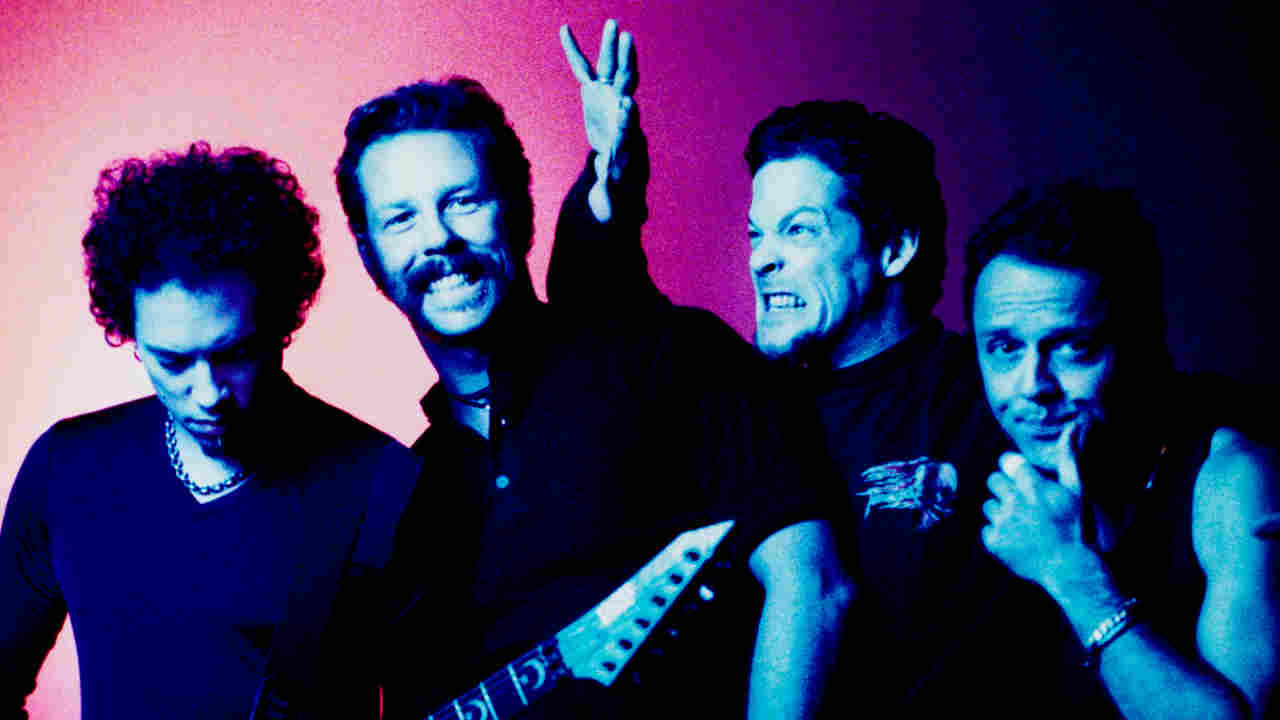Love, death and HIM: a classic interview with Ville Valo
In 2013, as HIM prepared to release their final album Tears On Tape, we sat down with Ville Valo to look back on his epic career
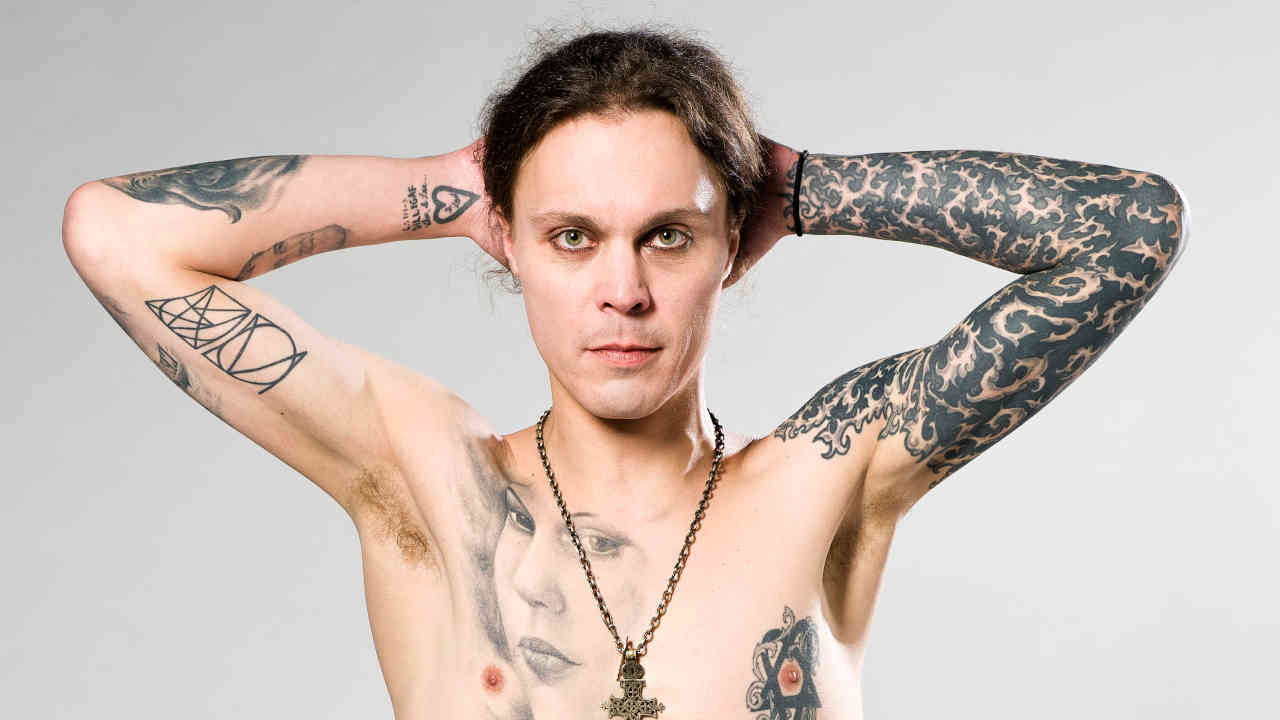
Select the newsletters you’d like to receive. Then, add your email to sign up.
You are now subscribed
Your newsletter sign-up was successful
Want to add more newsletters?

Every Friday
Louder
Louder’s weekly newsletter is jam-packed with the team’s personal highlights from the last seven days, including features, breaking news, reviews and tons of juicy exclusives from the world of alternative music.

Every Friday
Classic Rock
The Classic Rock newsletter is an essential read for the discerning rock fan. Every week we bring you the news, reviews and the very best features and interviews from our extensive archive. Written by rock fans for rock fans.

Every Friday
Metal Hammer
For the last four decades Metal Hammer has been the world’s greatest metal magazine. Created by metalheads for metalheads, ‘Hammer takes you behind the scenes, closer to the action, and nearer to the bands that you love the most.

Every Friday
Prog
The Prog newsletter brings you the very best of Prog Magazine and our website, every Friday. We'll deliver you the very latest news from the Prog universe, informative features and archive material from Prog’s impressive vault.
Few people do droll self-deprecation quite like Ville Valo. HIM may have notched up more than eight million sales since their inception in Helsinki 21 years ago, becoming Finland’s biggest ever musical export in the process, but their frontman can burst the bubble of pomposity and pretension – not least his own – with a well-aimed one-liner.
The majestic Ville is on prime form. He looks well-kept and refreshed, like a character from a Byron poem. His faultless English would put many native speakers to shame, and he’s both engaging and candid enough to talk about everything from his teenage dabblings with the occult, to working in the sex shop owned by his dad, to his own personal low point around the time of 2007’s Venus Doom album.
Given what Ville calls “the rollercoaster ride” that has been their career, there is, on so many levels, a hell of a lot to talk about.
“Do your worst,” he says, with a grin.
Your last release, Tears On Tape was HIM’s eighth album. Does it get any easier?
No, it gets tougher. [Laughs] As we grow older, there are a lot of sleepless nights. No, I guess you have to challenge yourself, pretend that you’re reinventing the wheel. That’s what rock’n’roll is about, right? Being an egocentric bastard.
How do you know when it’s time to make a new album? Do you wake up one morning and go, “Right, let’s do it!”
Sign up below to get the latest from Metal Hammer, plus exclusive special offers, direct to your inbox!
No, it’s the debit card bills. And it’s not looking good right now. We can’t afford to take taxis any more, I couldn’t afford to change the strings on my acoustic guitar. That’s one of the reasons. But no, it’s an urge. A very primal and sexual urge. At least on an intellectual level.
Care to explain the album title?
Tears On Tape was one of the first songs I wrote for the album. And obviously, it’s a simple title: it’s easy to remember, it’s very HIM… But the honest, heartfelt answer is that it’s referring to the tears that our idols shed – the Ozzys and the Robert Plants, the people who put their emotions on tape back in the day, creating pieces of art that have kept us going all these years. It’s about the healing power of hard rocking music. That’s what it means to me. And it sounds better than Tears On CD. Or Tears On Digital Ones And Zeros.
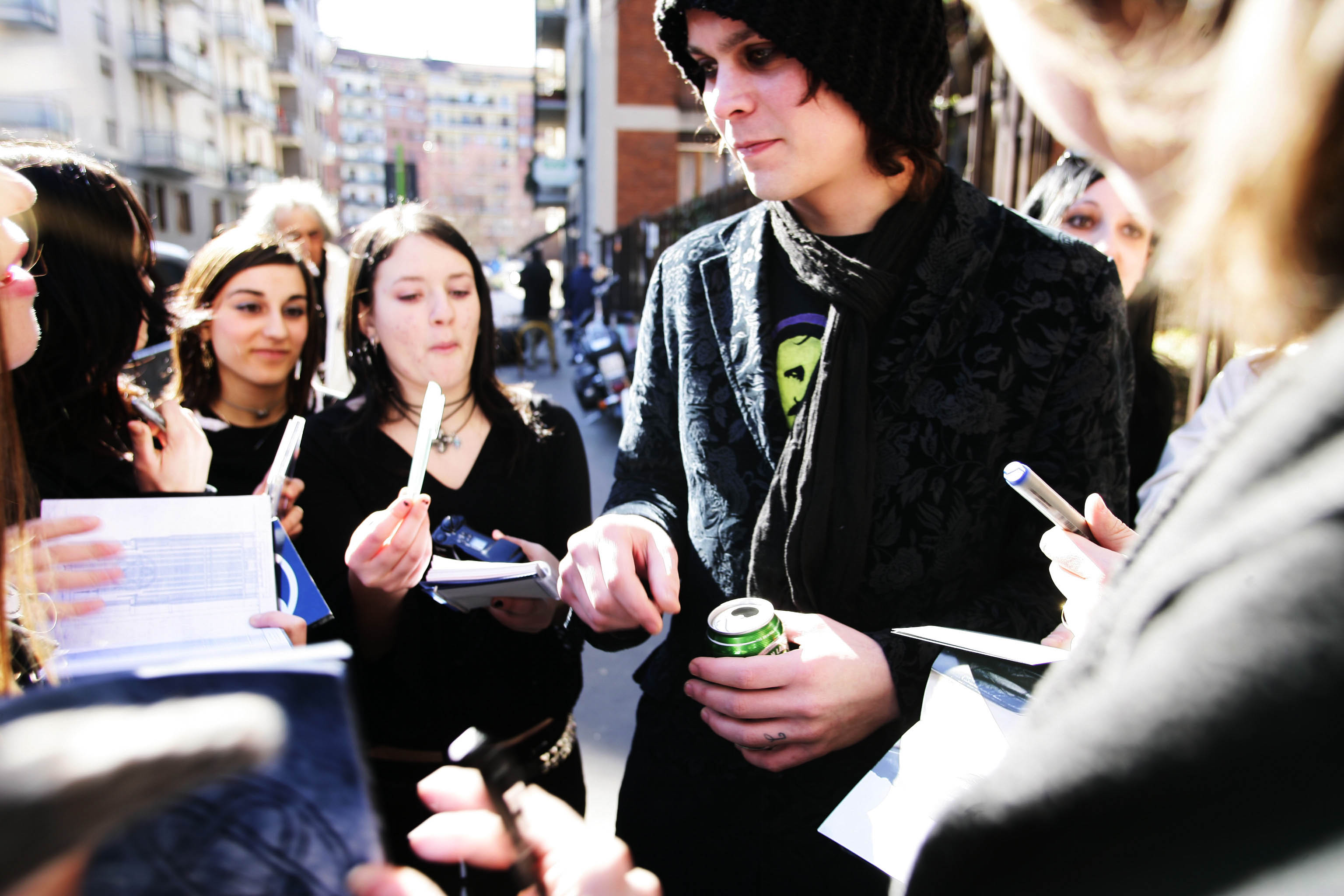
Is there a theme or a concept to the album?
Lyrically, I’m super-slow and I’m always stressed out, so I write all the lyrics in a week. So there is a theme in that respect, as I do tend to write about stuff happening all around me, more or less. Musically, it was a mood we were after – trying to capture the sludgy, Electric Wizard-meets-Kyuss-meets-Black Sabbath-type of riffs with the more wimpy, Roy Orbison type of stuff. And bringing those elements together in a mish-mash that would actually work, as opposed to doing a Roy Orbison song and then a metal song. It’s nice to play the acoustic guitar and pretend you’re from the 50s, while the band are pretending… whatever they’re pretending. As long as we’re all pretending.
The album took a long time to make. What was the delay?
It was heartbreaking. To be honest with you, when we started it didn’t sound that good. I was a bit frustrated with that, and we were struggling with the actual music, and all of a sudden, our drummer, Gas, started feeling this sharp pain in his hand. They found that he had some nerve damage, and at the same time Repetitive Strain Injury. The frustrating thing about that was the doctors couldn’t tell, a) whether he’d be able to play again, and b) how long it would take to heal, if it did heal. So we’d wait for 30 days, and the doctors were, like, “No you’ve got to wait another month. And another month. And another…”
That must have been hard for you as a band…
Everybody started losing faith. We were like, “Is the band gonna break up? What’s gonna happen?” We had this existential crisis, which enabled us for the first time in years to reflect a bit: “What does this band mean to us? What do the guys mean to each other?” Then we had a big meeting to try and figure out what to do: “Should we get somebody else to play if he can’t do it?” Gas was at the meeting – we didn’t want to talk shit behind anybody’s back. We were discussing the options – should we start working with somebody else, and when Gas gets better have him rejoin the band? Everybody was half-weeping, and we said, “No, we can’t do that. Let’s just wait it out.”
And you still didn’t know how long it would take for him to recover?
No, and that was five months in. And it took another three months. Eight months all in all. And then he said, “I think now is the time to go to the rehearsal place and try it out.” And we went in and played four nights in a row – we did a full blown gig set each night, an hour and a half. And everything went perfectly, which gave the band a lot of energy and a lot of belief. It’s re-finding your passion towards the music, towards the band, towards the fellas.
Were there any positives to come out of it?
You have to think of obstacles as challenges, or problems that need to be solved one way or another. And this enabled me to spend more time working on the songs, which was a good thing. And it let everybody take a breather, just to relax for a bit. That was a good thing about it. I think the album would be much weaker if he hadn’t suffered the injury.
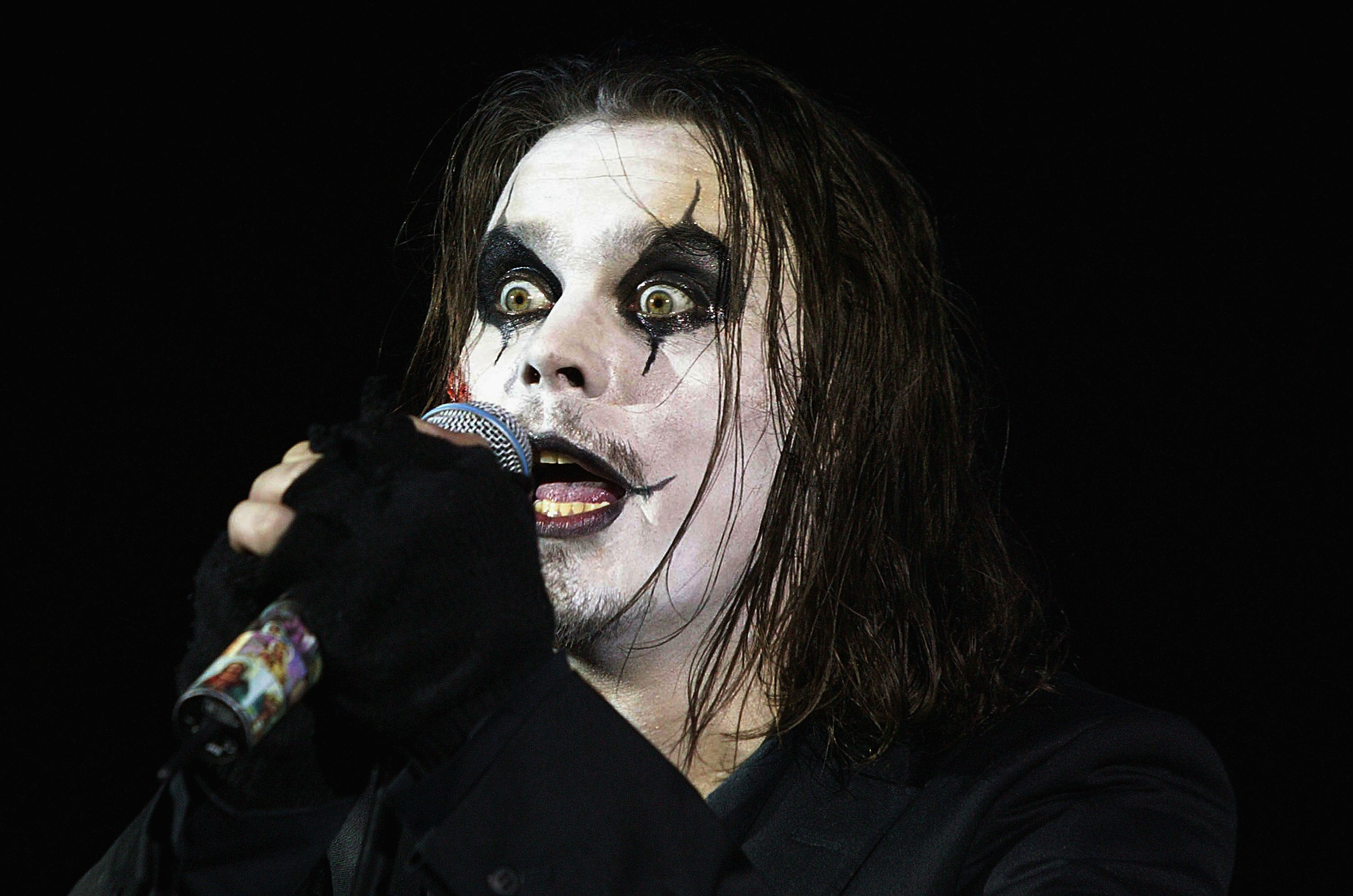
Did you come close to splitting up during that time?
We’re always splitting up anyway. We’re rather feisty. Especially because we’re a band that tours a lot. We’ve done this for such a long time that you start thinking, “This is everything – this is all.” You have to have those difficult moments. It’s a reunion every time we enter our rehearsal place.
You have been doing it for a long time…
Yeah, we started in 1992. I was, like, 15. It was only me, Migé and a drummer. I played a six-string bass. We were fighting about what we were going to be called as band. But then Migé painted ‘His Infernal Majesty’ on his cabinet. It stopped the whole conversation about the name: “That’s there, we can’t change it, that’s that.”
Did you know the others back then?
I’ve known Migé and Linde since I was about ten. We went to the same school. Migé went to high school with Burton, the keyboard player. Everybody’s known each other for ages. It’s a blessing and a curse. It’s tough to work with your best mates, but at the same time, you have a shoulder to cry on on the tourbus. People actually do care.
It sounds like a family…
The Addams Family, maybe. But it is a family nevertheless.
Let’s go back even further. Did you have a musical childhood?
No. My dad can’t sing for shit, but my parents listened to a lot of music. They told me stories about listening to old traditional Finnish folk music, and that was the only thing that could get me to stop crying. I remember my dad holding me and dancing around to the music. He used to be a taxi driver before he entered the sex shop business, and he had the radio on all the time when he was taking me to kindergarten and school. I listened to tons of music when I was a kid.
What was your first instrument?
I started playing bass guitar when I was eight. So it’s been quite a while.
And can you remember the first song you wrote?
Oh yeah. It’s terrible. I have it on cassette somewhere. I can’t remember what it was called. It might be that it didn’t have a title. It was a little instrumental piece, a full-blown Steve Harris copy. It was played terribly and it sounded terrible. But that’s the only way you learn, by making mistakes.
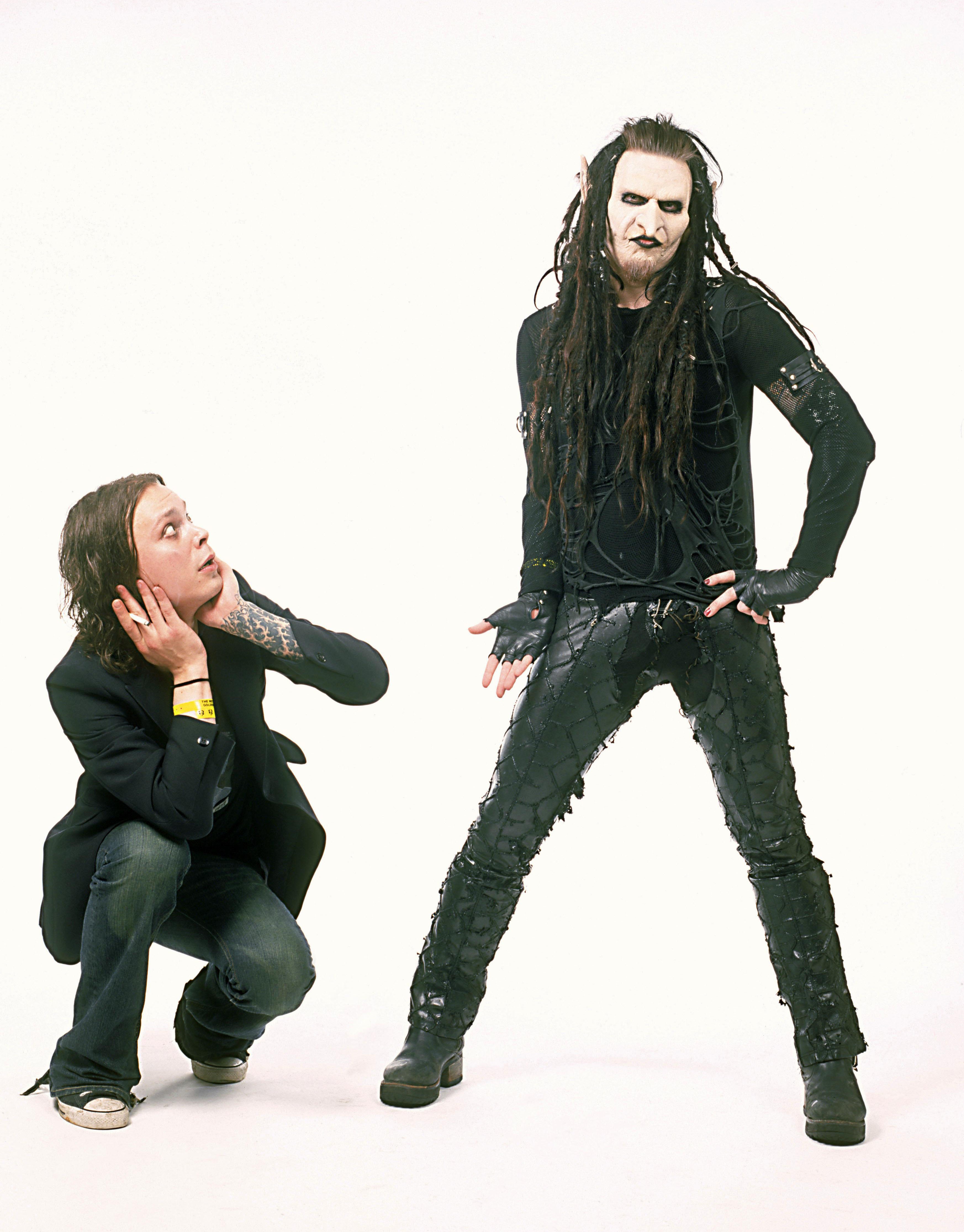
When did you start playing gigs?
I was about 14. I played in, like, seven bands at one time. I was “the bass player”. I was playing reggae one night, and Dixieland another night, and rock’n’roll another night. I started playing drums, and I went through a punk band. That was how I got my taste for beer – just getting messed up every night. Linde played guitar. It was a terrible racket. We did that for a while, and then you start to see who is passionate and who is not. It’s like when a hobby starts to develop and it becomes more of an obsession. And you see who is passionate about it and who is not. Some people started studying, other people went off and did something else. It was just me and Linde who were serious about it, and then me and Migé were serious about it. And then Migé went through the Finnish military service, and he was out of the equation for a while. So we kind of formed HIM twice – once with Migé, and then when he was all clean shaven, in the woods, with an AK-47.
Did you do military service?
No. Thank god, I had asthma. That was my way out of it. My time to do it would have been exactly the time when we got signed. It’s so tough to get a record deal anyway that we couldn’t muck about at all. Linde got what we call the red papers – it means you’re insane, incapable for warfare.
He put that on, right? He wasn’t really insane?
It’s difficult to tell. The jury’s still out on that.
Can you remember HIM’s first gig?
That was New Year’s Eve between ’92 and ’93, at a small club. All the amps blew up, there were 20 people there, it was terrible. But I was looking cool, so that was alright. I’d been playing bass in a gazillion different bands in the local club scene, so I knew what it was like to be onstage.
Had you sung before?
Not really. That was never my cup of tea. Around ’94, we did our first demo. I was playing drums and singing, and Linde was playing bass and guitar. With that demo, we were trying to find a proper singer. At the same time, I was secretly training my vocal chords. I was skipping school and listening to Angel Dust by Faith No More, Ritual De Lo Habitual by Jane’s Addiction and some reggae stuff – I’m a huge reggae fan. So I was doing that every day back home. I kind of wanted to try it out, but because I’d been playing some sort of instrument onstage, it felt really odd to stand there with a microphone. That’s probably the reason I started smoking. Chain-smoking and a bottle of red wine – it gives you something to hold on to.
What was the local Helsinki scene like at that point?
The scene was fairly big but fairly incestuous. A lot of people playing in the same bands and visiting the same clubs. But then a lot of bands weren’t that serious. In the mid-90s, it was impossible to think that a Finnish band would be internationally well-known, or even tour abroad. So it was more like you were doing it for the fun and for the beer. That’s how we did it for a long time.
- Jane's Addiction: "The first alternative band to break - not Nirvana"
- HIM: Through The Looking Glass
- The best 10 obscure '90s goth songs, by Ville Valo
- HIM 'flattered' to be offered Nephilim support
What changed?
There was a point where I thought we needed to take it a bit more seriously, take it a step further, try to figure it all out. And it took ages, as it always does. We made a gazillion demos, and they were all shit. And then we struck gold when we had the idea of playing Chris Isaak’s Wicked Game. We put that on a demo, and within two weeks we got signed by BMG in Finland. Which was crazy, because it was a major label.
Where were you when you got the call?
I was sitting in the tub. It was before cellphones, and my phone was ringing. I was all sopping wet and hopping to the phone. There was this dude saying, “It’s such-and-such from BMG Finland.” I thought it was a friend making a joke and I nearly hung up. But it proved to be true. I remember the first meeting with them. I didn’t know what to expect, so I put all my 70s regalia on. I looked like Jim Morrison on acid – big fur coat, super-bell bottoms, super-platforms, I was smoking, I probably had a beer in my hand.
It worked, though…
It did at the end of it. It’s funny – a lot of that stuff that people consider to be ‘rock’n’roll’ is based on insecurity. You hide behind flamboyance. Marc Bolan was supposed to be insecure when he started out. All that excess – it’s just tools, trying to be accepted.
Were you the one driving HIM at that point?
I’ve always been the more serious one, the guy cracking the whip. But if you get that taste of something you always wanted to come true, there’s no reason to spit on it. Some people get afraid, like, “[Indecisive voice] Ah, well, maybe I want to do something different…” But I was just, like, “Let’s see how far we can take it.” The EP came out – I think it was an edition of 500 or a 1,000. We made all our parents and relatives buy a copy. I spent my money buying a couple of copies. Then they started playing Wicked Game on the radio, and we made a couple of friends, and that was when we got played on the radio at that time.
Were you still working in your dad’s sex shop?
On and off. I was never there full time – I’d help out part time. My parents were super-helpful. My dad paid my rent when I moved out. They had a belief. “Let the fella try. Let’s see what happens.”
In your head, were you always going to be famous?
I don’t think it was about fame. I always felt a certain safety in music. Like Iron Maiden, it’s a world you enter and you close the doors behind you, and it’s your own head space – your own place where you can hide from the world. And so that’s how it always was for me. I was a big fan of Steve Harris. I loved the fact that he played so fast you couldn’t see his fingers. We used to call it ‘The Misty Sausages’.
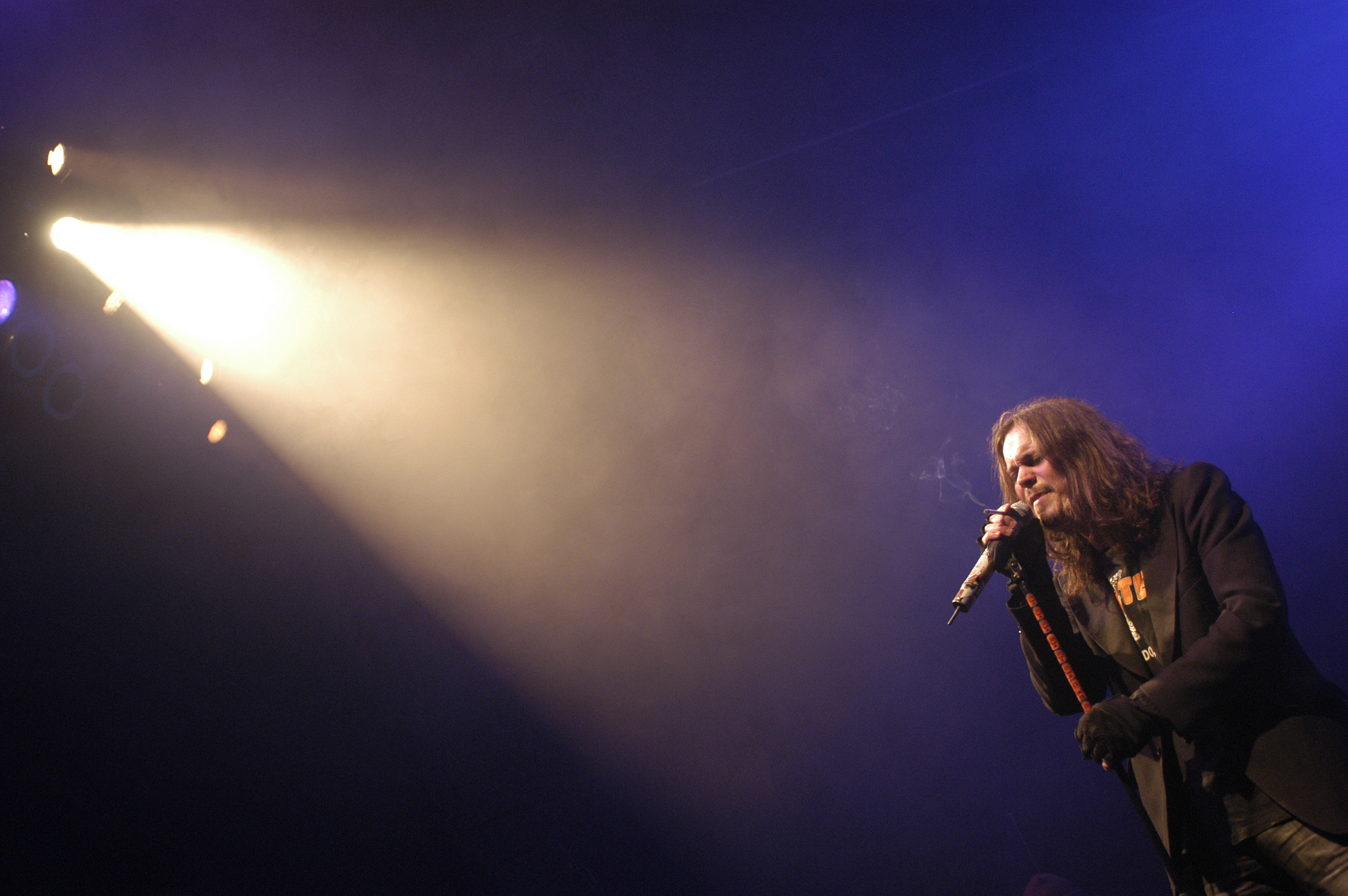
Have you ever met Steve Harris?
No, I haven’t.
If you did, would you tell him about ‘The Misty Sausages’?
Yeah, of course. We’re not trying to pull his leg. It’s a tribute. Actually, it’d be a good name for a tribute band. Steve Harris’ Misty Sausages.
Early on, there was an air of the occult around the band. Was that something you were seriously into or was it just a cool image?
No, it wasn’t an image thing. When you’re young, you get these existential questions, and you start reading philosophy and reading about religions. You see your friends turning to Christianity, or to the other side, or to whatever side. It was more about the fascination – going to find these rare books in libraries. We’ve always tried to honour the masters with what we do, and at the same time have our tongue in cheek about it.
In the 90s, Scandinavia was the home of Satanic music.
Yeah, at the time, when we called ourselves His Infernal Majesty, we had a lot of shit from black metal bands – they were like, “What the hell are you doing? You’re playing this mediocre hard rock and you’re using our imagery!”
Did you ever have any physical trouble from black metal fans?
We played this place in the middle of Finland. Half of the crowd were these goth-black metal people spitting on us. And the other half were these Jehovah’s Witnesses holding Bibles and praying. We were, like, “What the hell?” And the place was packed! We were like, “Sure, we’ll take your money – do whatever you want.”
Did you feel like the weird kids in the corner at that point?
It was like that for a while. Not exactly dangerous, but it was… adventurous. But we were happy to be the weird kids in the corner. It was nice to be outsiders. And in a way we still are. The whole Love Metal genre, it’s a big raised finger to all the genres and whatever, it doesn’t really matter. We play the music we want and stuff that comes out of our hearts. It’s still the same. It’s funny that people still have a tough time placing us and what we are. And I think that’s a good place to be.
It didn’t take long for HIM to get noticed outside of Finland. What did it feel like being in the middle of it?
It felt like being on a roller-coaster. The first album we toured shit-tons in Finland – I think we did one gig in Sweden or whatever. Then we went to Germany for the first time. We played in front of maybe 200 or 300 people, it was going really good. Then we met John Fryer, the producer – it was like the first time talking to an Englishman, being here in the big BMG building for a proper meeting. Like, “What the hell’s this?” And then John kind of led the way – we went to Rockfield in Wales to record Razorblade Romance. After that, all hell broke loose. We released a song called Join Me In Death in Germany, and it became No.1, which is crazy with a title like that. And the album Razorblade Romance went to No.1 in early 2000. All of a sudden we were in limousines and on big talk shows. We played a lot of TV, a lot of kiddies’ shows.
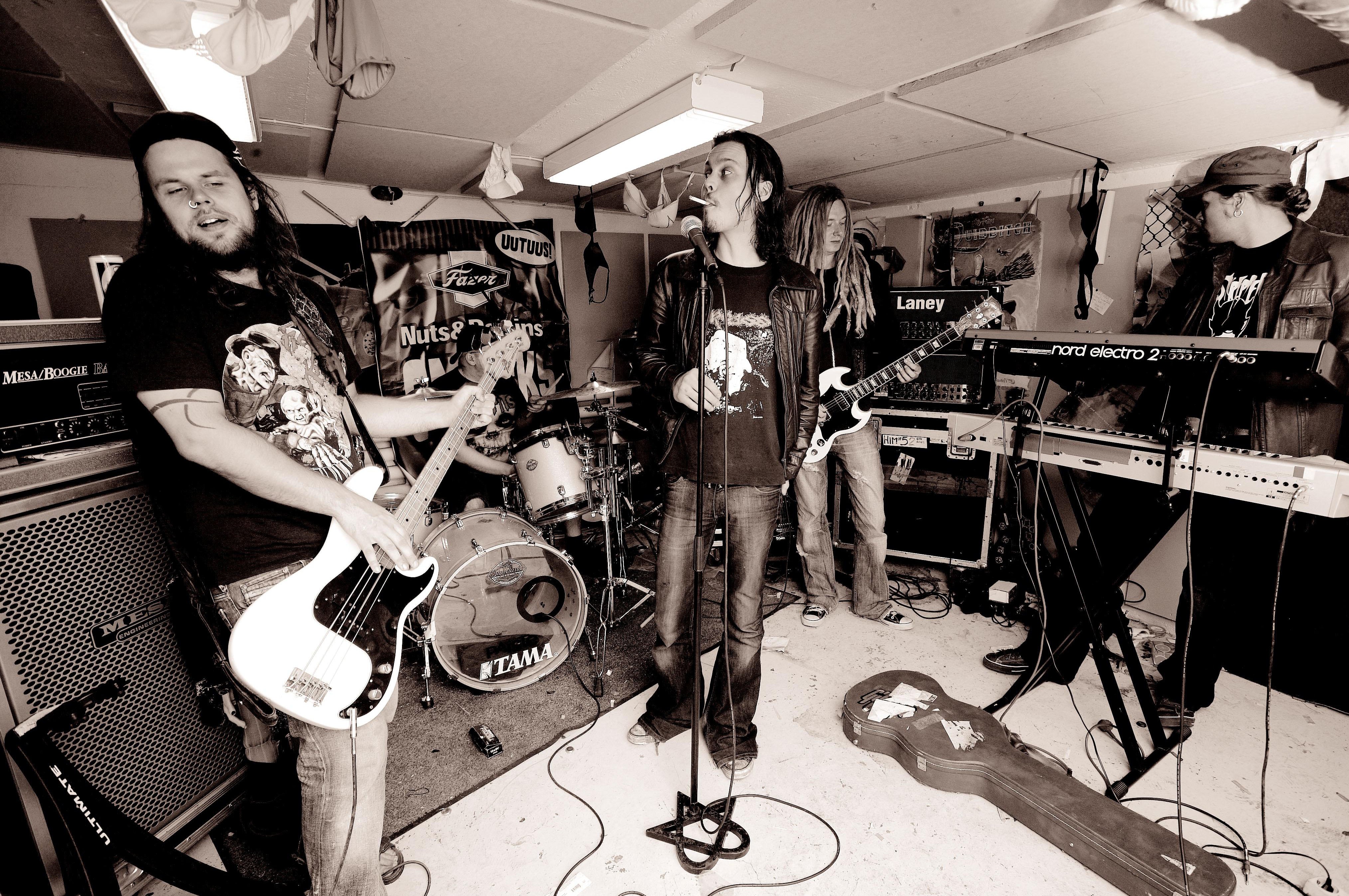
Were you enjoying it?
We were laughing about it. We’d never had the money or the possibility to travel, and we were absorbing so much information.
Tell me about HER. What was it like to have a sex change?
[Laughing] Ah, the HER thing. There was the American Him – an arty-farty project of some guy from Chicago. He was, like, “This is my identity, and this is very important to me.” Then all of a sudden, it was like [mimes shaking a bag of money in someone’s face] ‘Cha-ching, cha-ching, cha-ching’, and he was like, “Okay, you can use it.”
How much did you have to pay?
I can’t remember. I think it was thousands of dollars. And that was a very big deal to us. But it’s part of rock’n’roll mythology – there’s a lot of stories like that. You have to laugh about it. Even Nirvana had the same problem. I’ve always felt that we’ve walked in the path of monsters. Way behind, obviously.
Was Razorblade Romance the point when you realised the world could open up to HIM?
No rock band wishes just to be famous in Germany. Obviously, we had tasted a bit of success, wanted to expand our territory, like dogs pissing around. What we did, we did an album called Deep Shadows And Brilliant Highlights, which did okay. That enabled us to tour for the first time in the southern parts of Europe. BMG in the UK didn’t give a flying fuck about us. So we saved up all our money and spent it all on a bus and a pub tour in England. We did maybe 15 gigs, and there were like 20 people at each gig.
What was that like?
It was exciting. To be in Birmingham for the first time – Sabbath, Priest, all that. It was the stomping ground of legends. Like, that could have been the urinal that Ozzy peed in back in ’68.
Do you remember your first gig in Britain?
It was such a long time ago. I’m pretty sure it wasn’t in London. We did places like Bradford and Leeds. We did a goth night at this club, and everybody hated us. We played 20 minutes and then got the fuck out. Ewan McGregor was in the hotel, I remember that.
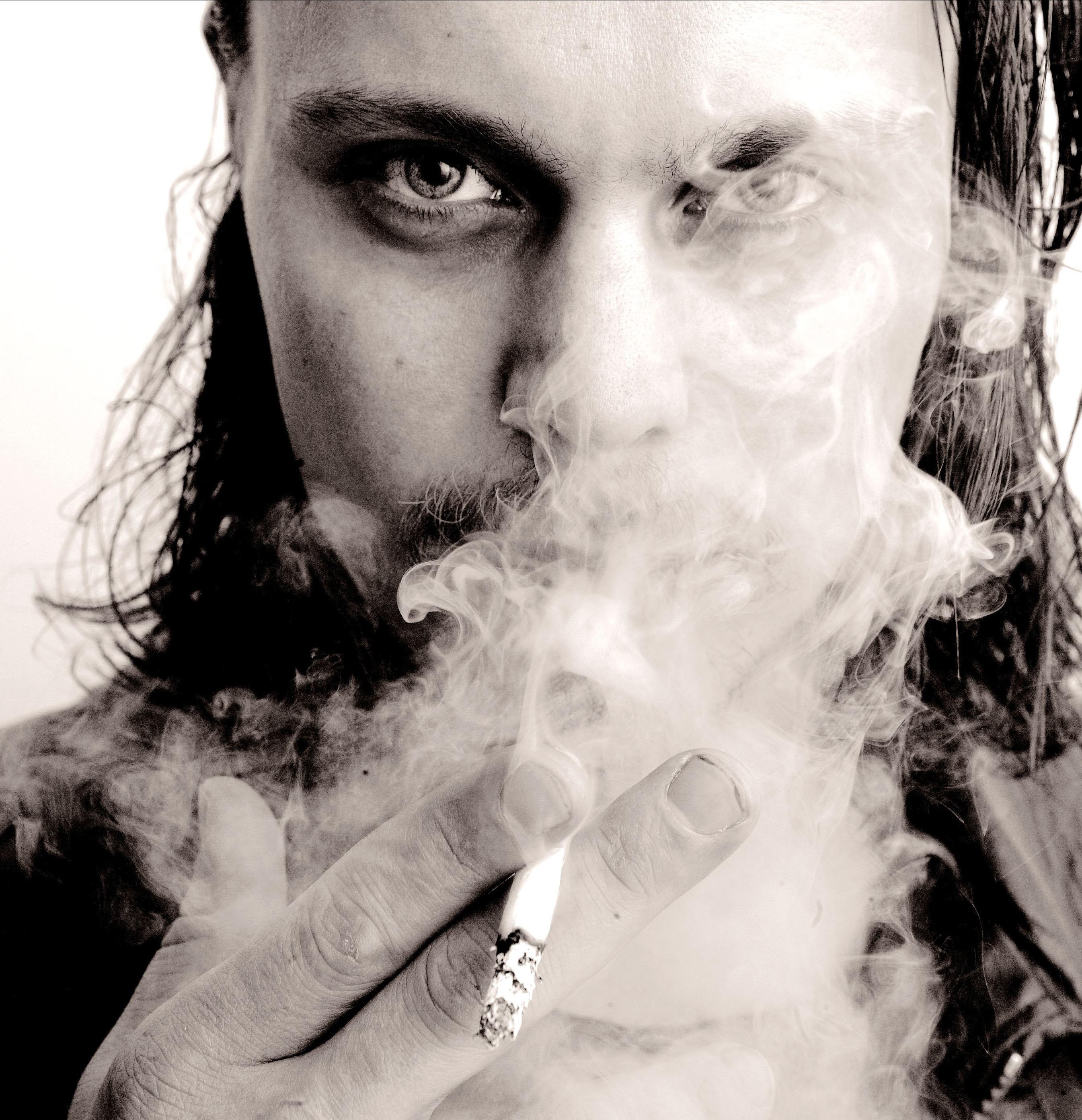
What were your first impressions of America?
I had no expectations. We want there on a one-off trip back in 2000. We’d just met Bam Margera from Jackass, and he invited us to go over and play in Philadelphia at a party. We played 30 minutes. Some people loved it, some people hated it. We went back about two weeks before the Twin Towers fell. There’s a picture of me in a van, and you can see the towers as my horns. It’s really spooky.
Did you get any grief for the Satanic associations of your name?
Not really. When you meet us you do understand that we’re not totally evil. Just a bit evil.
How did you handle that first rush of success?
Did it send us crazy? I think we were a bit crazy before. But the success happened step by step and country by country. I consider it lucky we didn’t have a global overnight success, because that would have broken everybody’s brain.
Your first three albums all featured you on the cover. Did the fact that you seemed to be the face of the band cause any friction with the others?
You should probably ask them. With the first album, we just had an idea for an arty picture, and it worked. With Razorblade Romance, the picture was iconic and funny, like Michael Jackson meets Marc Bolan. And because it worked out so well, we went with the flow for the third one.
You’re going to hate this question. How did you feel about being a sex symbol?
To be honest, I don’t know what a sex symbol is. Compliments are nice, but I’ve always liked compliments on the music more. I’m a nerd. I like to talk about the music.
Love Metal was a huge step up for the band, certainly in the UK. What was it like being in the middle of it?
For me, with Love Metal we found the identity of the band. We toured so much, and we’d started working on material that was a bit more Sabbath-y, and we felt that the Heartagram was bigger than my face or anybody’s face. We wanted to get that symbol across. That’s why we went with it on Love Metal. Musically, it has all the elements. For me, it was like a moment of realisation: “This is what we are, and this is what we’re going to do.” That realisation created unity and strength within the band, because we were all going in the same direction. Tours were going really well, we were getting more attention in Britain, stuff was starting to happen in America.
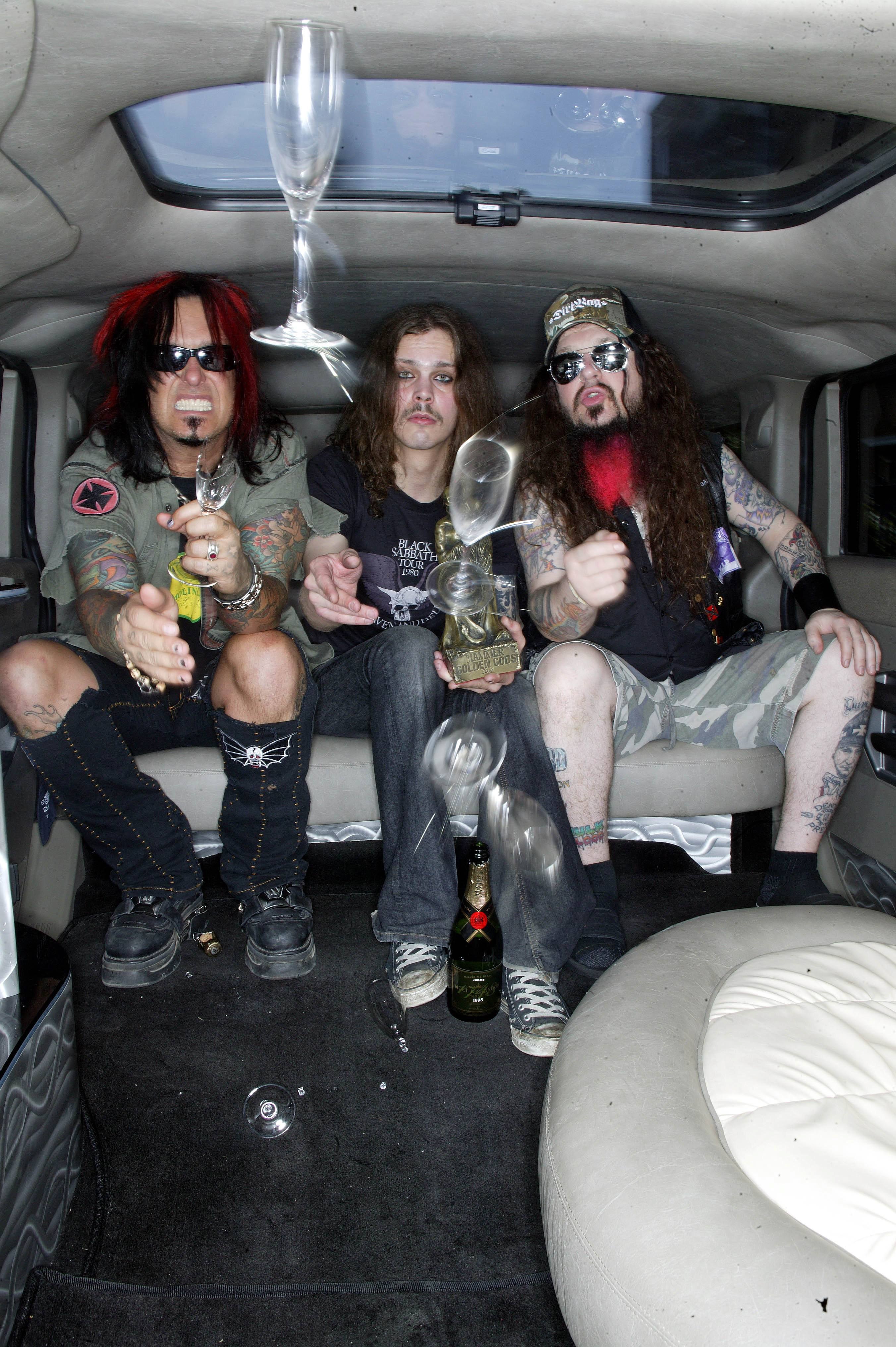
With your next album, Dark Light, you became the first Finnish band to go Gold in America. You must be proud of that achievement?
It was the only gold disc I’ve not given to my parents. But it’s one of those things – when you’re doing well, you’re super-busy all the time and you don’t have the time to appreciate the fruits of your labour. You can’t stop because things are going well – more gigs, more songs. That’s how it was for many years. And it’s probably something that wore me out a few years later.
Venus Doom was a very different album. It seemed like you were challenging yourselves with it.
You always have to challenge yourself. There’s no point going by routine. It went back to my roots – My Dying Bride, old school Anathema, older Paradise Lost. We wanted to make a super-heavy, super-slow, fucked-up album. It was a kind of distorted cry for help, on all levels. Mood-wise, I was in a fairly dark place at that point, partying a lot, having a hard relationship.
How dark did things get?
They got fairly bloody. I was drinking tons and not being able to sleep at all, I was puking blood and shitting blood, I wasn’t eating for weeks and just living off of beer. It was tough. It’s what we Finns called ‘self-medication’. What you try to do at first is party, and it helps you out at first, but then when you have to chase the hair of the dog all the fucking time, and you have to drink a case of beer just to get to a normal level, then you have a couple of shots of Jack Daniel’s and you’re on top. And then it starts all over again. When you do that for months and months, it wears you out really fast.
What was the lowest point during that period?
Well, there was the first nervous breakdown I had. We were actually recording Venus Doom. I woke up not knowing where I was, with a great northern owl on my windowsill, hooting at me. I was, like, “What the fuck’s going on? This is so surreal – there’s an owl on my windowsill, where am I?” I hadn’t washed for days, I was grimy and fucked up and bloated. That was the first time I ever had to call the guys and the producer and say, “I can’t make it to the studio today.” All of a sudden, you can’t cope with reality. It seems like everything’s falling apart, you lose your sense of perspective, you lose a sense of past, present and future. I don’t know how to explain. It must be different for different people.
How did you make it through the recording of the album?
I tried to take it as easy as possible, to eat something just to make it through the day. And then I was taking it a bit more easy when we flew over to LA to mix it, but once the mixing started going okay, I started hitting the bottle again. And then it went really pear-shaped, and at some point I just said to our manager, “I can’t cope with this, I need some help.” I went to the doctor’s, and they said, “You need to go to the emergency ward straight away.” I said, “I can’t, because I have an interview to do.” It’s funny, I was laughing about it, but everything was messed up. And then Seppo, our manager, he helped me find a place in Malibu where I could take some time off. That really helped. And after that, I was sober for about four years.
Were the rest of the band there for you?
That sort of thing is very hard to talk about. We’re not Americans in the way we can share and care and do these therapy sessions. What they did was a real Scandinavian thing, which was to give me space. And I respected that support. They were probably super worried, and trying to figure out whether the rehabilitation was going to do any good, or whether it was all going to start again and I was going to be all fucked up. It became a matter of pride for me to stay sober, and do an album sober, which was Screamworks. It was just a different angle.
- VIDEO: Ville Valo Talks Inspirations And Flaws
- Nightwish, HIM to receive stamp honour
- Listen to Ville Valo cover Abba on the new MGT album
- The story behind HIM’s Heartagram
Golf is the classic rock star recovery sport. Did you consider taking it up, hanging out with Alice Cooper and so on?
Nah, I’m not the sporty type. The AA thing is, “I have an illness that cannot be cured, and you need a higher power.” I remember that I was in rehab, and you had to take the Serenity Prayer: “God give me the serenity to do blah blah blah…” I can’t use that word. Whenever it was my turn to do that prayer, I’d say, “Ozzy, give me the strength and serenity to go on…”
Do you see yourself going down that path again?
When Gas’s hands broke down, I got drunk for the first time in ages. And it was fun, and then I had a pretty heavy year after that. It’s good to go into the night on occasion, and then you appreciate the other side as well. You can’t do what we’re doing and get fucked up all the time. When you’re a bit younger you can push it a bit more, but then you’re going to do shit shows and that’s not fair to the people who paid for the ticket and travelled to see you, and it’s not fair for the rest of the guys in the band. It’s about trying to find a balance. I’m an on-and-off guy. If I drink, I drink properly, for long stretches of time. And if I don’t drink, I don’t drink at all.
Let’s talk about something less dark. Who’s your favourite artist?
I’m a fan of art, but I’m the kind of guy that would rather have Picasso’s brush than a piece by Picasso. I’ve always found the process of getting there and the ideas behind it more interesting than the actual pieces of art. At the moment, I’m really into Austin Osman Spare, though he is a lot more than an artist – he’s a magician and a freethinker. The era he lived in, the turn of the 20th century, was an interesting time, and that has a lot to do with the actual art as well – how, when, where and why it was created. Caravaggio or whoever – they’re technically great pieces, but they don’t talk to me because I can’t understand life when it happened.
What about films? Do you view them in the same way?
I love people who bring their own personality into those films. I have phases. I always have. I get obsessed with one thing at a time. At one point I loved Hitchcock’s stuff, at another point I was into Luis Buñuel and all that stuff. Maya Deren too – she was a surrealistic woman director, a crazy person, in a good way. A lot of the time, it’s more about the character. I used to be an addict for a rock’n’roll biographies. I’d read about artists I didn’t even like that much. But I was interested in how they got there. Maybe I should have been an anthropologist. I dunno, I find anything interesting.
Were you ever tempted to get into acting?
I’ve had offers in the past. Nothing too big, nothing too interesting. But I’m not an actor. I’ve always felt that we need to sell about 80 million copies more for me to become an actor, a painter, an opera singer or a TV personality. I think it takes a certain amount of boredom to want to go down that path.
Who are the three people, living or dead, you’d invite to a dinner party?
Fuck… that’s a tough one. Jesus Christ would be the obvious one. Or people like Edgar Allan Poe, HP Lovecraft, Austin Osman Spare. But then you wouldn’t pick three people from a similar place, you’d need people who would fight. Donald Duck, Mussolini and Anton LaVey. Actually, to be honest with you, I’d probably invite my mates. I could be the butler, trying to figure out what they’re talking about.
You mentioned that lot of rock stars are insecure under the surface. What about you?
It goes in phases. The good thing about our band is that we might be pretentious and overly flamboyant when it comes to music, but we don’t have an alter-ego when it comes to us as people – we are who we are and what you see is what you get, for good and for bad. It makes stuff so much easier – if people don’t like you, they can fuck off. It’s the easiest attitude. Because it saves you a lot of thinking. It enables your little hard drive, your brain, to concentrate on the essentials. Which in our case is to steal riffs and put the pieces in a different order and claim it as our own.
Is there a part of you that thinks, “I’ve done all I need to do. I can knock it on the head now”?
No. There are times when I get bored or when I feel repulsed when I see an acoustic guitar. After a long tour, or after an album, you can get a kind of musician’s block. You think, “Why the hell am I doing this? That’s it, I’m done.” But then there are discussions that I can’t have verbally – I can only have them musically. It’s just that one melody, the one moment… It’s a communication without words, and it’s a communication with yourself, a kind of meditation. From within somewhere, you find these notes that take you into a headspace that you’ve never been before, or notes that take you to your childhood, or into Autumn, or somewhere you’ve never been before. That’s what makes music really interesting. For me, it’s the hiding place, a way to get away. It’s way better than booze and drugs.
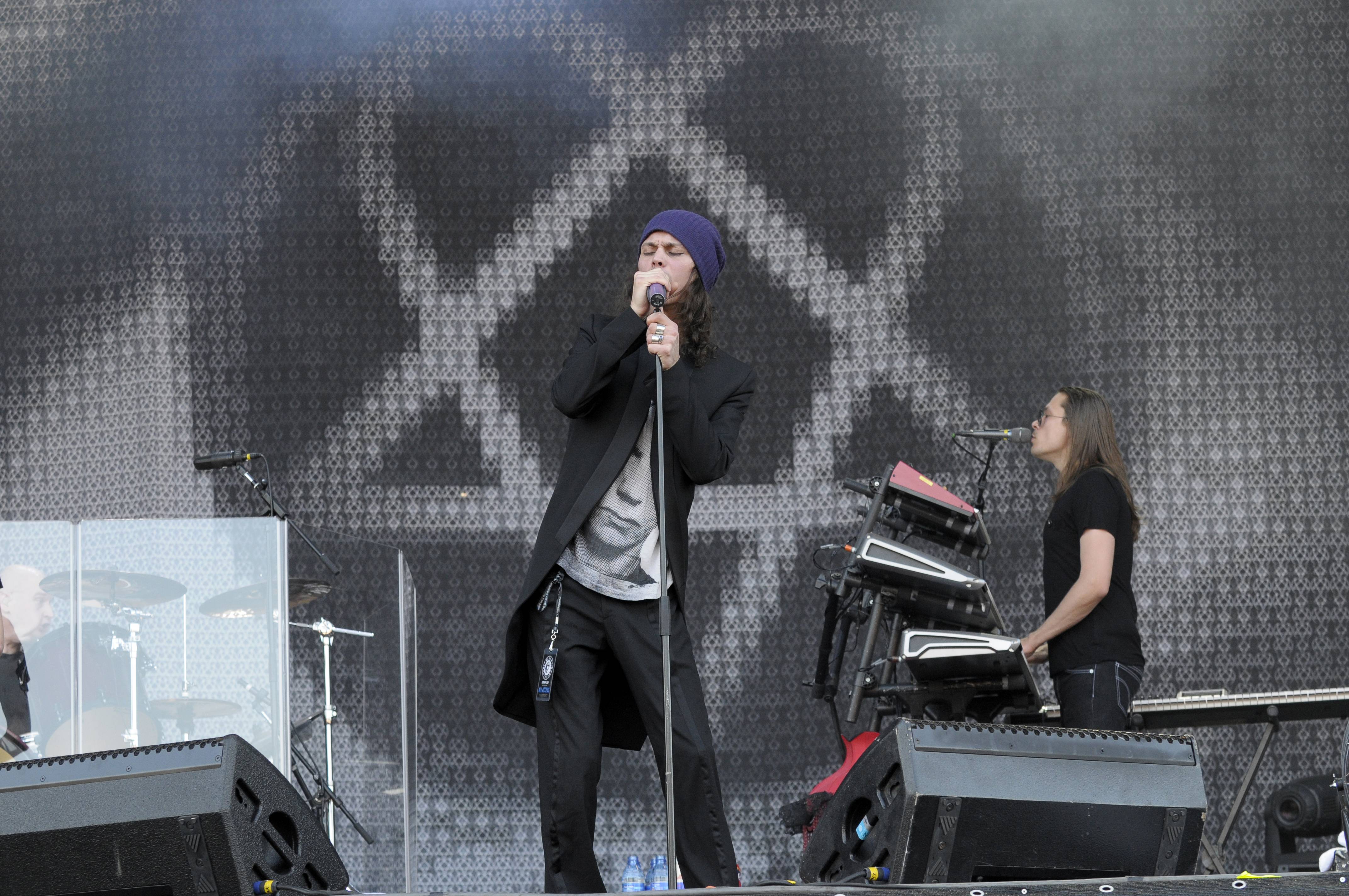
Do you ever listen back to your old records and go, “Who is that guy”?
Oh yeah. I don’t spend time listening to our old albums, but when we started the latest record, I did peep back, just to check what we did. At times you’re so into what you do that you think you’re reinventing the wheel, and then you go back and listen to a song and you go, “Oh, fuck, that’s exactly the same riff I wrote back in ’99!”, or whenever. It happens all the time. There’s tons of stuff I wouldn’t do now, but then again, I do understand that we did everything for a reason at that time. That’s how we felt at the time, and I think the honesty is the important thing when it comes to it.
How proud are you of HIM’s legacy?
Well, I’m proud to be friends with those guys who have supported me through many horrific and horrendous and wonderful years. That’s my personal way of thinking about the legacy. It’s fairly rare to live a life with your best mates, all around the world, experiencing all these wonderful and horrendous things, meeting great people, making new friends in far away countries. I certainly don’t have the talents to become anything else anymore. That’s all the brain damage I’ve done to myself.
Dave Everley has been writing about and occasionally humming along to music since the early 90s. During that time, he has been Deputy Editor on Kerrang! and Classic Rock, Associate Editor on Q magazine and staff writer/tea boy on Raw, not necessarily in that order. He has written for Metal Hammer, Louder, Prog, the Observer, Select, Mojo, the Evening Standard and the totally legendary Ultrakill. He is still waiting for Billy Gibbons to send him a bottle of hot sauce he was promised several years ago.

